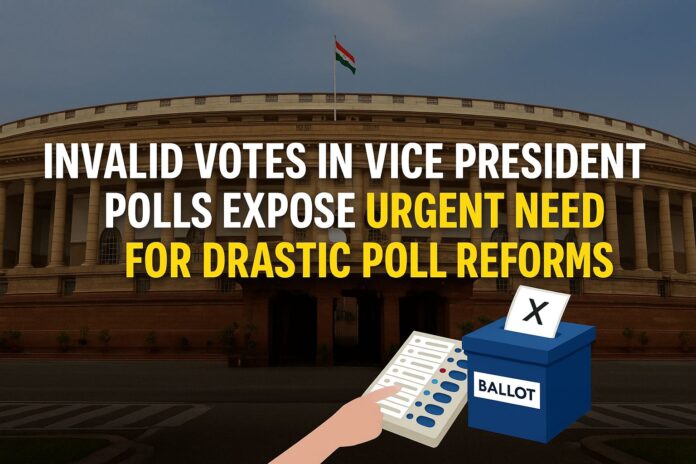News365 Times |
India takes pride in being the world’s largest democracy. Yet, the recent election for the post of Vice President of India — a position for which only Members of Parliament are eligible to vote — witnessed 15 votes being declared invalid. Such a lapse in a restricted electoral college of seasoned lawmakers reflects poorly on the credibility of India’s democratic framework, and calls for sweeping reforms to restore integrity, accountability, and dignity to the electoral process.
The Case for Minimum Qualifications
It is indeed an irony that some of the world’s best-trained administrators in the Indian Administrative Service (IAS) and allied services are often ruled by political leaders with little or no formal education. To address this imbalance, many experts advocate for a minimum educational qualification for contesting elections.
A stronger solution lies in considering the creation of an Indian Political Service, modeled on the IAS, to professionalize governance and reduce the influence of family-driven politics. Experience shows that senior bureaucrats appointed as ministers have often delivered effectively, while several less-educated ministers have been dropped due to non-performance.
Poll Reforms Beyond Consensus
India’s election reforms cannot remain hostage to the elusive idea of “political consensus.” The George Fernandes episode — where he was elected to Rajya Sabha despite severe memory loss and had his oath read out by a colleague — highlights the urgent need for medical fitness certificates before allowing candidates to contest.
Equally, reforms like simultaneous elections for Lok Sabha, Assemblies, and even municipal bodies are necessary to reduce cost, prevent disruptions, and ensure continuity. Elections for the President and Vice President too should be integrated into this framework, conducted transparently through EVMs with VVPAT.
Fixing the System of Leadership Elections
Prime Ministers, Chief Ministers, Speakers, and Deputy Speakers should be chosen through secret and compulsory votes of House members with nominations backed by at least 34% of members. Leaders could then only be removed by the same mechanism — with a mandatory naming of an alternate candidate.
Such a system would minimize instability caused by hung Houses and mid-term collapses, bringing India closer to the dream of One Nation, One Election.
Ending Multiplicity and Misuse
No candidate should be allowed to contest from more than one constituency or simultaneously from Parliament and state assemblies. MPs and MLAs should automatically forfeit their seats if they assume ministerial office at another level. The infamous fall of the Atal Bihari Vajpayee government due to a single vote by then Odisha CM Giridhar Gamango — who had not resigned from Lok Sabha — underscores the need for such safeguards.
Other critical reforms include:
- Secret EVM voting for Rajya Sabha seats, with proportional term allocations.
- Abolition of Legislative Councils, often misused for political rehabilitation.
- Barring security-losing candidates from contesting for six years.
- Making NOTA a real deterrent by disqualifying candidates polling fewer votes than NOTA.
Accountability and Transparency
Attendance in Parliament should directly affect eligibility for future elections — with a proposed 75% minimum attendance rule. Immunity from prosecution must not extend to acts of corruption or bribery committed under the guise of legislative proceedings, as seen in the JMM-bribery case.
Parliamentarians must compulsorily disclose full personal and financial details — including assets and family particulars — in the public domain to prevent concealment and malpractice.
Defaults on government dues, from electricity to rent, must be auto-deducted from salaries and pensions. Those occupying government housing illegally should be barred from elections until dues are cleared.
Curbing Political Excesses
Political parties must be brought under the RTI ambit, ending opacity in their funding and functioning. All forms of indirect subsidies — free land, Doordarshan slots, or exemptions — must be abolished. Election funding exemptions under the Income Tax Act (Sections 13A, 80GGB, and 80GGC) should be scrapped to block money laundering.
Equally, mega-rallies and roadshows — often extravagant and corruption-prone — must give way to live TV debates between candidates, shifting the focus from money to merit. Schemes like MPLADS, viewed as corruption-prone, should be abolished, and pensions for MPs/MLAs withdrawn, given that government servants no longer enjoy such lifelong entitlements.
The Way Forward
From upper age limits for candidates to cooling-off periods for retired judges, the range of suggested reforms is wide and urgent. To prevent perpetual delay in Parliament, the Election Commission of India should be empowered to implement reforms after giving Parliament one year’s notice. If Parliament fails to object, the reforms should automatically take effect.
The episode of invalid votes in the Vice Presidential election is more than a minor embarrassment — it is a warning signal. For the world’s largest democracy to remain credible, India must adopt far-reaching poll reforms that strengthen institutions, discourage opportunism, and place governance above politics.



